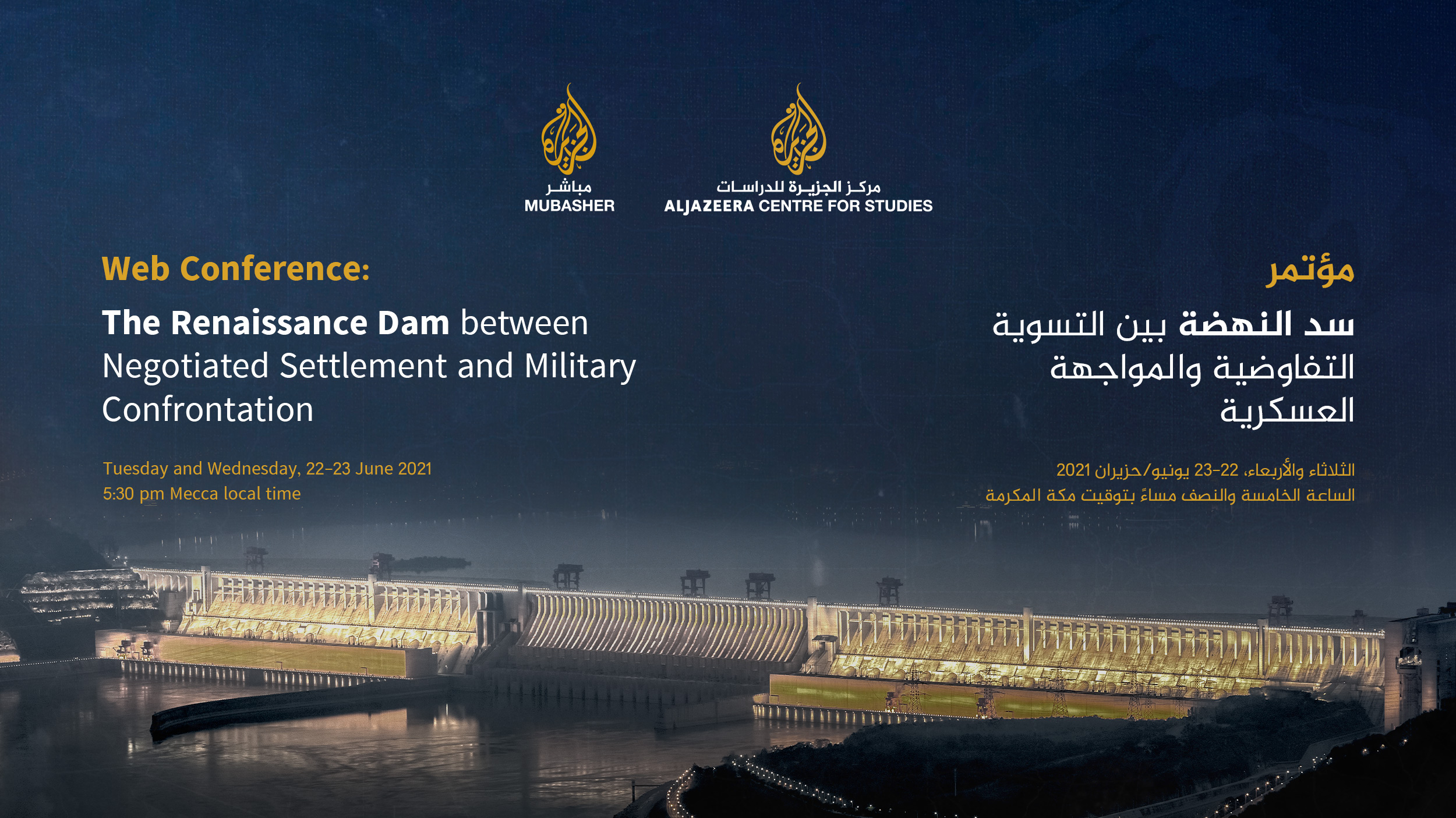
Al Jazeera Centre for Studies is organising a web conference under the title, “The Renaissance Dam between Negotiated Settlement and Military Confrontation,” with the participation of a select group of experts and researchers specialised in water affairs, conflict resolution and military affairs.
The conference will take place on Tuesday and Wednesday, 22-23 June 2021, and will be broadcast live on Al Jazeera Mubasher and live-streamed on AJCS’s digital platforms.
The conference comes in the context of Egypt, Sudan and Ethiopia’s failure to reach an agreement regarding the Renaissance Dam in the negotiations that took place in Kinshasa, Democratic Republic of Congo last April before the second filling of the dam, which is due to take place in about a month. Moreover, Addis Ababa announced that it is going ahead with the filling with or without a deal with Cairo and Khartoum.
The conference coincides with the rise of the possibility of military confrontation, as experts believe, especially after statements from Egyptian and Sudanese leaderships that they do not rule out resorting to alternative options, hinting at military activity, to prevent Ethiopia from harming their countries. This was reinforced by Egyptian and Sudanese military forces’ organisation of three major manoeuvres over the course of six months – an average of one manoeuvre every two months. Ethiopia responded and said that is prepared for war and could recruit a million Ethiopians to defend the dam or mobilise its military forces near the Sudanese border.
According to the vision of the conference organisers, if the three countries fall into military confrontation, it will lead to situations outside of everyone's control and catastrophic results that will affect the entire Horn of Africa, the Red Sea, the Gulf states on the opposite bank, international trade, and the connection between the Indian Ocean and the Mediterranean Sea. Furthermore, there will be immense implications for international, especially Arab, security.
Accordingly, Al Jazeera Centre for Studies’ conference will convene to discuss these aspects. Participating in it, as mentioned above, will be experts from the aforementioned three countries as well as other countries that have interests in the issue of the Renaissance Dam. The discussion will focus on the varying visions of the three countries of the importance of the Nile and the Renaissance Dam. Participants will address legal aspects and points of negotiation as well as the possibility of a military confrontation and its potential scenarios. Finally, it will conclude with a session about the alternative courses of conflict resolution that take into account the interests of the three parties and spares the Horn and the Red Sea of serious turmoil.
The conference programme is as follows:
programme |
|
Day One, Tuesday, 22 June |
|
| 17:30-19:00 |
Session One:The Nile and the Renaissance Dam: Conflicting Priorities This session discusses the disparity in Egypt, Sudan and Ethiopia’s visions of the importance of the Nile and the Renaissance, Dam and the stages in which these visions were formed. It also highlights the aspects of agreement and disagreement between them. Speekers:
|
| 19:30-21:00 |
Session Two:The Nile and the Dam: The Controversy of Agreements and the Closed Negotiation Circle This session discusses the agreements and the treaties regulating the relationship of the three countries to the Nile and the Renaissance Dam, explores their historical contexts, the international parties sponsoring it, and those concerned with its implementation. Speekers: • Badr Hassan Shafei, Egyptian academic and media personality |
Day Two: Wednesday, 23 June |
|
| 17:30-19:00 |
Session Three:Bloody Water: The Possibilities of War on the Dam and its Consequences This session discusses the circumstances under which the conflicting parties may be forced to go to war, compares their military capabilities, and explores the potential courses of military operations and their various consequences on the three countries and neighbouring regions. Speekers: • General Safwat El-Zayat, military researcher and former officer in the Egyptian army |
| 19:30-21:00 |
Session Four:Mutual Benefit: Removing the Dam from Zero Solution Equations This session looks into alternative courses for dispute settlement based on mutual benefit and guarantees; discusses obstacles to these courses; and identifies the parties benefitting from the success of these courses, the necessary conditions and the resulting gains. Speekers: • Raphael Lapin, A South African negotiation and dispute-resolution specialist who advises corporations and governments globally |